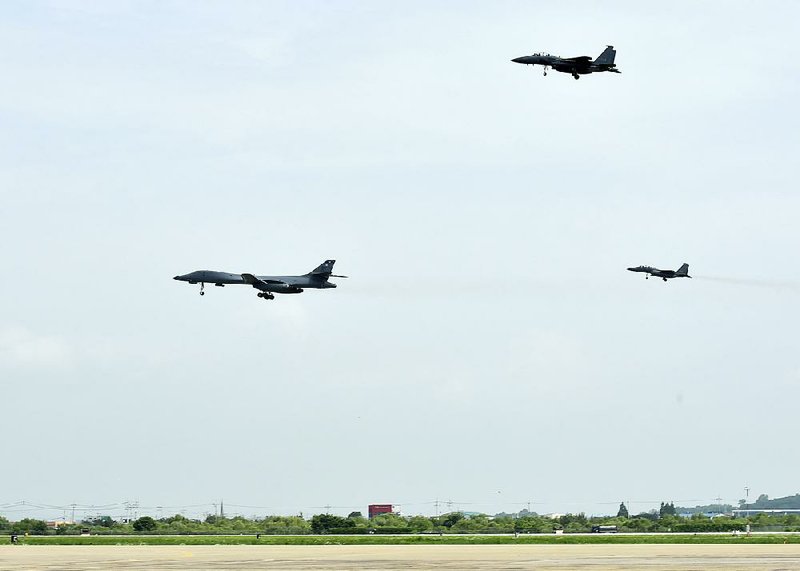The United States flew two supersonic bombers over the Korean Peninsula on Sunday in a show of force against North Korea after the country's latest intercontinental ballistic missile test.
The B-1 bombers were escorted by South Korean fighter jets as they performed a low pass over an air base near the South Korean capital, Seoul, before returning to Andersen Air Force Base in Guam, the U.S. Pacific Air Forces said in a statement. It said the mission was a response to North Korea's two ICBM tests this month.
U.S. forces also conducted a successful missile-defense test over the Pacific Ocean, sending aloft from Alaska a medium-range ballistic missile that it detected, tracked and intercepted using the Terminal High Altitude Area Defense system.
"The time for talk is over," U.S. Ambassador to the United Nations Nikki Haley said in a statement. She denied reports that Washington would seek an emergency session of the U.N. Security Council.
Japanese Prime Minister Shinzo Abe said he and President Donald Trump spoke by phone today and have agreed to take further action against North Korea. Abe said Trump pledged to "take all necessary measures to protect" Japan.
Amid the show of force by the United States and its allies, North Korea said it would respond with a "resolute act of justice" if it were provoked either militarily or economically.
"In case the U.S. fails to come to its own senses and continues to resort to military adventure and 'tough sanctions,' the DPRK will respond with its resolute act of justice," the state-run Korean Central News Agency quoted a Foreign Ministry spokesman saying, using the abbreviation for the North's official name, the Democratic People's Republic of Korea.
The spokesman said the United States should "wake up from the foolish dream of doing any harm to the DPRK" and warned Washington against a pre-emptive nuclear strike.
Frustration in Trump's administration has grown in recent days, since Pyongyang on Friday conducted its second successful test of an intercontinental ballistic missile. It landed off the Japanese coast, but experts said that if the missile had flown in a lower arc, it could have reached the U.S. mainland.
U.S. officials have been trying to get China, North Korea's main trading partner and economic lifeline, to exert pressure on its neighbor. Secretary of State Rex Tillerson has called China and Russia the "principal economic enablers" of North Korea. Although China voted last year for harsh U.N. sanctions against North Korea's leaders and state-tied companies, it fears that a destabilized regime would send refugees flooding across the border and has urged dialogue as the only pragmatic approach.
Trump on Saturday criticized China, tweeting that "they do NOTHING for us with North Korea, just talk. We will no longer allow this to continue." And Vice President Mike Pence, traveling Sunday in Estonia, told reporters that "all options are on the table."
"The continued provocations by the rogue regime in North Korea are unacceptable, and the United States of America is going to continue to marshal the support of nations across the region and across the world to further isolate North Korea economically and diplomatically," Pence said.
North Korea conducted its first nuclear weapons test in 2006 and has been hit with six sets of U.N. sanctions since then. The North claims its weapons are for defensive purposes. But a series of missile tests conducted since Kim Jong Un came to power have increased concern that North Korea may be closing in on the ability to fit a nuclear weapon on a missile's nose cone.
"People have been warning about the North Korean ICBM for 20 years," Joseph Cirincione, president of the Ploughshares Fund, a global security foundation, said Sunday on ABC's This Week. "But the wolf is at the door. This a very real threat to the United States."
Sen. Dianne Feinstein, D-Calif., speaking on CBS' Face the Nation, called North Korea a "clear and present danger" that must be taken seriously.
"I'm convinced that North Korea has never moved at the speed that this leader has to develop an ICBM to put solid fuel, to have an interesting launch device, and to have a trajectory which, as of the latest analysis, would enable it to go about 6,000 miles and maybe even hit as far east as Chicago," she said. "We can't have that."
Feinstein said she hoped that John Kelly, the incoming White House chief of staff who starts his new position today, would be able to begin negotiations with Pyongyang that would eventually end its nuclear program.
South Korea announced Saturday that it will start talks with the White House about building more powerful ballistic missiles capable of striking the North.
Gen. Terrence O'Shaughnessy, Pacific Air Forces commander, called North Korea "the most urgent threat to regional stability."
"If called upon, we are ready to respond with rapid, lethal, and overwhelming force at a time and place of our choosing," he said.
Information for this article was contributed by Ashley Parker and Madhumita Murgia of The Washington Post; and by Kim Tong-Hyung of The Associated Press.
A Section on 07/31/2017

